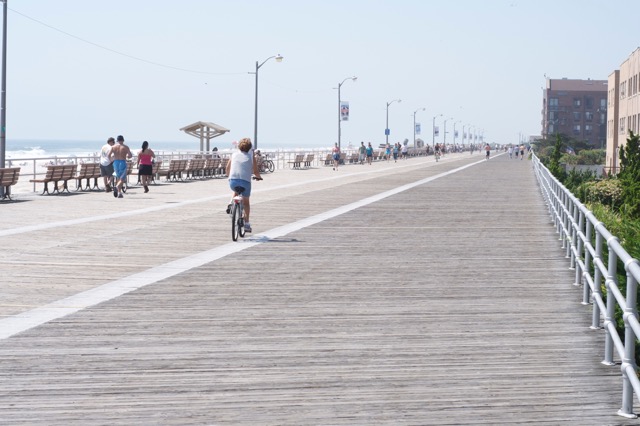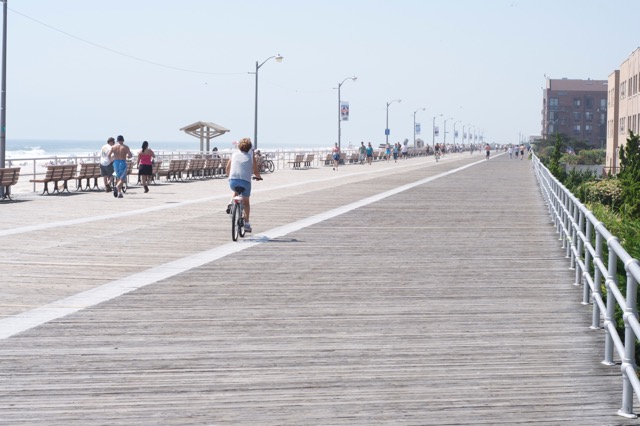
When I was growing up, my family was in Long Beach regularly visiting my aunt Carol and uncle Rocco, friends of my parents who lived blocks from the ocean. My memory insists that it was always summer when we were there: barbecues, somebody’s birthday. And the Fourth of July parties, all-day affairs the adults would spend on the stoop eating burgers and macaroni salad while us kids—myself, my older brother, Carol and Rocco’s son, Matt, some neighborhood kids—played basketball in the street. We’d break up our games to let pass the teenagers carrying surfboards under their arms, the minivans driven by dads in wayfarers. The whole town was headed beachward. We’d make our way there, too, when, at night, the party migrated to the boardwalk so we could watch the fireworks. They’d light them right there in the sand, close enough that we’d catch their odor, like burning barbecue. We could even see the ones they were launching west of us, in the Rockaways and Coney Island, some of them jutting out over the water, the blue and red bursts reflected in the dark ocean. Maybe all my Long Beach memories from back then are of summer because that’s when the town was at its most magical.
*
When I was in my late teens, my grandfather began to develop Alzheimer’s. I’d lived in the same house as him my entire life. I grew up with him taking me to school, to the park, with him letting me dip my Stella D’oros in his coffee. Now, he was going to bed at four p.m. He was going days without shaving before approaching me looking ashamed, holding up his razor. “Show me how, would you?” He was getting lost on his walks, wandering town for hours. His condition worsened; he was diagnosed. We took care of him for two more years before giving in: he needed a nursing home. My aunt Carol told my mom she had friends with parents at the Grandell, at Long Beach’s west end. My mom and I visited, met the admins. He’d move in that December.
For the next three years, I was in Long Beach a couple times a week visiting my grandfather. I’d drive to the Grandell after class or after finishing a shift at Key Food. Physically, my grandfather remained vital, which allowed us to take him out for lunch or a cup of coffee. Sometimes, we would even take walks on the boardwalk, the cyclists zipping past us, the wooden planks rickety beneath them. He loved to sit on the benches and stare out at the ocean, counting the oil tankers on the horizon.
There was also the occasional bad day. “What the hell am I doing in this place?” he’d demand, then would turn nasty when I told him he couldn’t leave. I’d been told about the ignorant bliss of Alzheimer’s; the family, according to the wisdom, suffers more than the patient. But these days confirmed my worst fear: that he knew exactly what was going on, and that he felt forgotten, unloved. Now, I’m able to see that, as Alzheimer’s goes, he—and we—got lucky: he didn’t get it until his late eighties; it was rare that he wasn’t in a good mood. But at the time, I was devastated, furious. Long Beach didn’t seem so magical anymore. It was the first time someone close to me had been ill, and what’s less magical than illness? What clearer reminder of our ordinariness?
My grandfather died in 2011. I’m still in Long Beach regularly: for the restaurants on Park, for the boardwalk, which, after being torn to splinters by Hurricane Sandy, was rebuilt into a trendy place: food trucks, rental bikes, cold brew coffee. And that beach. I spend whole Saturdays there: swim, read, sleep, repeat. Sometimes, Matt—who loves and still lives in Long Beach—will join me, park his beach chair next to mine. I worry about this town—how long before the next super storm?—and feel a connection to it that’s a little odd to me, since Long Beach isn’t my hometown. That’s Ozone Park, where I was born, and Franklin Square, where I did most of my growing up. But I have a lot of memories here. A lot of them are happy: the ice cream shop where he produced a quarter from his pocket and said he was treating me; those Fourth of July parties. There are painful ones, too: there’s the diner my grandfather and I were at the first time I had to help him use the bathroom. All of these experiences, I think, were formative. Maybe that’s enough to make a place feel like home.
Steven Williams has taught writing and literature at Rutgers University-Newark, Long Island University, and St. John’s University. He grew up on Long Island.
Photo courtesy of Paul Williams.




